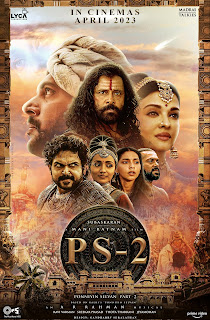2018 is the Malayalam movie that ended the drought at the Kerala box office. It has achieved great critical reviews and is breaking collection records. I watched it last day, after it ran for almost 3 weeks to packed houses. There were certain sections of society that tried to create controversy out of it. One community accused the movie of failing to do justice to the rescue operations undertaken by them. Supporters of the ruling party allege that the movie doesn't highlight the efforts of the government in a positive way. The director of the movie, Jude, stoked the controversy by claiming that he used a particular actor as the CM so as to deliberately show him as a weak person who struggles to find a way out of the situation. In spite of all these, the common people related to the simple story of the prevailing human spirit, told from the background of suffering that they had firsthand experience of.
Instead of making a docudrama like Virus, which largely had real characters and situations that were documented, 2018 uses the method of the movie Titanic to tell its story. Titanic uses the real incident of the sinking of the biggest ship ever built in human history until then, in its maiden voyage, to tell a fictional story of unrequited romance between two people from different strata of society. The romantic element is used to connect with the imagination of the public so that when the eventual tragedy unfolds, they are more invested in its depiction. Romance provides an added layer to the actual events, even those that don't directly concern the main plot.
Jude Anthany Joseph introduces an array of characters from different social levels and with different ambitions in the first few scenes of the movie, and every one of them has their own crosses to bear. A young man who has eloped from the army and is paranoid of an impending investigation, an upcoming model who is ashamed of his family background of seafaring fishermen, a government officer who has toiled his whole life to build a beautiful home, an IT professional working abroad who is facing divorce proceedings, a truck driver who has fallen for propaganda and hates people from his neighbouring state—all of them are weighed down with identity crises that arise from societal burdens. When the flood happens, invariably all of them find themselves at a crossroads where they have to face their crises and break out of them for the greater good. Thus, 2018 uses simple fictional tales of personal redemption and portrays a much larger picture of a populace facing a deluge and emerging victorious.
But there are certain serious questions that the movie, which champions individual victories, poses to the public. The deluge of 2018 unveiled the inadequacy and serious lack of preparation of our government machinery in tackling such crises of enormous proportions. We saw an MLA begging for help on live television. We saw the inadequate warning systems before the dams were opened and water rushed into the property and houses of unsuspecting citizens at midnight while they were deep asleep. We saw the inability of government departments to coordinate their responses, in spite of most of them doing stellar work themselves. We saw the government depend on the goodwill of fishermen for rescue operations when their own machinery was incapable.
The questions that moviegoers, after watching 2018, should ask our government system are these:
What are the lessons learned from 2018?
What improvement will be there in the responses if, by any chance, another flood hits Kerala in 2023 or 2024?
And most importantly, if another flood hits us, will the burden of rescuing us fall again on the shoulders of poor fishermen?
%20(30).jpeg)
%20(31).jpeg)
%20(25).jpeg)

%20(26).jpeg)
%20(27).jpeg)

%20(18).jpeg)
%20(19).jpeg)
%20(20).jpeg)
%20(22).jpeg)
%20(14).jpeg)
%20(12).jpeg)
%20(13).jpeg)
%20(7).jpeg)
%20(8).jpeg)
%20(7).jpeg)
%20(1).jpeg)
%20(8).jpeg)
%20(6).jpeg)

%20(23).jpeg)
%20(24).jpeg)



%20(3).jpeg)
%20(4).jpeg)
%20(2).jpeg)
%20(1).jpeg)